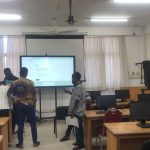Ambassador for climate change and renowned rapper, Kwame Nsiah Apau, popularly known by his stage name Okyeame Kwame, has called for the reassessment of how humans perceive the natural environment.
He spoke at a special seminar on Friday, the 24th of November 2023, organized by the Centre for Climate Change and Sustainability Studies in partnership with Climate Development knowledge at the University of Ghana, with the theme being, ‘Harmonizing Art and Activism: Improving Climate Action through Music and Education.’
According to him, humans see themselves as central to nature and are the core causes of degradation due to climate change.
“I do not think that human beings are the most important species on earth. We usually position ourselves to be better than all the animals and so we eat them. I think it leads to the concept of speciesism. And if we can begin to relook at how we look at the plants or how we look at the power or how we look at the plants, as how we look at the river, if we can begin to evaluate ourselves. If all the human beings on earth, if all of us die, this place will be beautiful. All the trees will come back. All the rivers will stop looking like meadows. The skies will clear. The quality of the air will be nice. The quality of the soil will not be reduced.”
He emphasized that a conscious shift in human perception towards the natural environment could lead to a more positive climate change.
“Because human beings think that we are more important than this nature that holds us together, but if find yourself and you become climate-conscious, you stand in the right position to change your conversation, to change the narrative and bring some sanity to this thing that we are doing”
He urged aspiring climate change advocates to grasp the significance of taking action, cultivate resilience, and recognized that the conversation on climate change possess a critical nature as it contradicts with different concerns and beliefs
“As an advocate, you should understand the change you seek, internalize, and decide to take action by developing resilience, this is because the conversation that we are having, the borders of cultural grounds, the borders of traditional grounds, affects religion. ‘If God says that we should eat meat, how dare you say that the family of livestock also stores percent of degradation? Therefore, if you stop eating meat, are you asking God? There is a very cognitive inertia. Right there around the conversation, God says that we should eat meat. How dare you say, if I want to store degradation, I shouldn’t eat meat. So you can’t get faster. Because the inertia is also causing dissonance. Getting them to reject their communication company.”
He reminded the attendees of the importance of selflessness in advocacy, urging participants to approach their efforts with the mindset that this duty is owed to Mother Nature.
“… but with resilience, with assistance, I’m not giving up. I’m saying that we are not doing this to become popular. We are not doing this to be paid. You are doing it because it is your natural duty as a cohabitant in this area. This is the contribution of the people. You can do everything that you have to do for people. But it is their responsibility to decide whether to take action or not.”
“Yes, it takes time for Social change. Even let us look at individual change. It took me 47 years to stop, 43 years to stop eating meat. Change is difficult. Even though it’s the only thing that was really happening. So for social change, I think it takes a while. I don’t know if it’s possible. for a social change to happen you have to observe it for 10 years.”
Individuals who were at the seminar shared the ways they contribute their quota for advocating climate change.
“I work with an organization, that encourages people to collect their discarded water sachets and we turn them into eco-friendly bags and fashion accessories left on the ground, bags including school bags and cosmetics bags. In my community, I encourage more of the locals to gather these, and they bring them to our factory in return, we give them something in return depending on the weights.”
“I am with the forest commission, in our own way of dealing with climate change, so now there are rules and regulations that strictly scrutinize the number of trees each member can harvest at a time and then the kind of trees, some are old age, they will break on their own, yes, some like that, you can harvest it, but one that is in good condition is in good standard, you know, we don’t allow it.”
“It is important that I add I am from the Northern region. So I see the impact of climate change on this one. So I have a small organization, we speak about the impact of climate change and how we can go along with the still being used to change.”
The centre organizes these monthly gatherings which provide a space for discussions and strategies to enhance climate.
–
Story by: Cindy Selasi Humade | univers.ug.edu.gh




